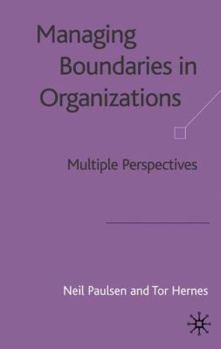Managing Boundaries in Organizations: Multiple Perspectives
Select Format
Select Condition 
Book Overview
Drawing together an international group of scholars, this book provides fresh and provocative perspectives on boundaries in organizations. The emergence, management and transformation of organizational boundaries is intrinsic to modern organization and poses one of the most persistent and potentially rewarding challenges to researchers and managers alike. The book offers the latest insights into the nature of boundaries, how they may be interpreted and studied, as well as implications for managing. The chapters include theoretical perspectives and cases from Europe, Canada, the USA, Australia, the Middle East and Africa.
Format:Hardcover
Language:English
ISBN:1403903298
ISBN13:9781403903297
Release Date:May 2003
Publisher:Palgrave MacMillan
Length:311 Pages
Weight:1.16 lbs.
Dimensions:0.9" x 6.4" x 8.8"
Related Subjects
Children's Books Humanities Logic Logic & Language Philosophy Politics & Social SciencesCustomer Reviews
7 customer ratings | 6 reviews
There are currently no reviews. Be the first to review this work.




















